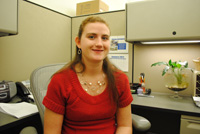Editorial
Front Page - Friday, January 14, 2011
Siskin provides clients opportunity to rejoin the workforce, gain job skills
Erica Tuggle
 Amanda Branscum, a client from the Siskin community re-entry services program, now works at the Chattanooga Housing Authority, thanks to the assistance and skills she received while in the program.
- Erica Tuggle
Amanda Branscum, a client from the Siskin community re-entry services program, now works at the Chattanooga Housing Authority, thanks to the assistance and skills she received while in the program.
- Erica Tuggle
Simply having a job or productive outlet away from home can mean the world to someone. After a brain injury caused by a car accident, stroke, or an illness, this simple necessity can be in jeopardy. The community re-entry services program at Siskin Rehabilitation Hospital can help an individual with a brain injury to re-enter the workforce by providing them with the skills to find and keep a job.
Mark Heydt, community re-entry specialist at Siskin, says clients of this program have volunteered and/or found employment after the program with many locations including childcare facilities, the Chattanooga Housing Authority, Blood Assurance and Erlanger Hospital.
When an individual is referred to the vocational services department for this program, they undergo an evaluation that looks at their current skills, abilities, interests, aptitudes and limitations that apply to a job setting, and this helps as a guide to what jobs may be appropriate for the individual and if they are a good candidate to return to employment. The length of the program then varies from two months to over a year until the point clients are able to secure and keep paid employment.
Involved in this process is work on cognitive skills that a brain injury may have affected such as attention and focus skills, memory difficulties and behavioral issues. In the program, clients also practice for interviews, put together resumes and use volunteer work to develop work skills, gain a good reference, determine what type of work skill the client can do and participate in volunteer work that can possibly lead to
paid employment.
Amanda Branscum is a client from the community re-entry services program whose hard work and dedication throughout the program led to her volunteer opportunity at the Chattanooga Housing Authority turning into her current filing and office position there.
Branscum has epilepsy, which made finding and maintaining a job with understanding co-workers difficult. When she lost her job and was unable to find another, she visited the career center and was put in touch with Heydt. Before the program, Branscum had been in daycare work, but wanted to branch out into office work, and her evaluation confirmed she had good skills for this area. After eight months in the re-entry program, she was offered a paid position.
Branscum thinks the reason they offered her the position was that they saw how much she was putting into what she was doing, from purging the massive files there to reorganizing the whole file room. She says her new job gives her a sense of pride to say she can contribute to something. Before the program, there was a five month period where she wasn’t doing anything but sitting at home – and since she had worked since the age of 14 before that, she was unused to this.
“It was like, if I can’t work or find a job now, can I at least volunteer somewhere? Then it happened to be the program was there to pick me up, give me something to do and get me out of the house, and for me, that was a huge thing because it gave me something to do everyday from Monday to Thursday,” she says.
During the program, Branscum’s group took day trips where each client was designated a day to be the “leader” to plan the entire day for the group, making sure to follow guidelines and consider everyone’s physical needs in their plan.
“The best result for me was when it was my day and finding that it worked, and I did this,” Branscum says. “It gives a person a sense of pride to say ‘I accomplished this, I came up with this,’ and [job coaches] are there to help and give feedback, so when your next day comes around you can improve on things that didn’t go so well.”
Branscum says she especially appreciates the support she has been given at the housing authority for her illness and the alterations it sometimes produces in her workday.
“If there is a time where I have to be out due to my illness or just being sick in general, they are awesome about not holding that against me. The support here means so much because you don’t get that in very many places.
“If I do have seizures at work, they are super supportive, know what to do for me and instead of sending me home–like what has previously happened at other jobs – they will allow me to rest, and after I have slept it off, they will ask me if I want to stay or go home ... To be in a place that understands my disabilities and know that’s part of me, but doesn’t keep me from doing what I have to do, then that’s a big thing for me.”
|
|